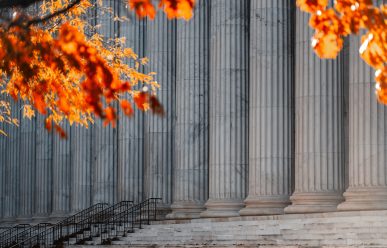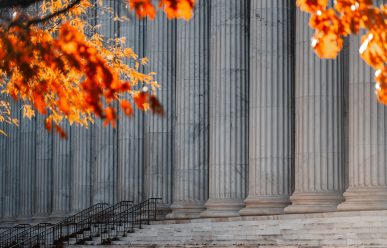You go to the mailbox one day and find a certified letter. Upon opening the letter, you discover that you’ve just been sued! Not only that, but the case is in a Federal Court in a state that you don’t live in and that you don’t have any connection to, or so you think.
Can you really be dragged into court in this foreign jurisdiction? Well, that depends on whether the court has personal jurisdiction over you. One part of the personal jurisdiction inquiry is determining if “minimum contacts” exist.
So, what are “minimum contacts”? This is a legal and factual issue that the Supreme Court of the United States has addressed several times over the last century, not to mention many other federal trial courts and federal appellate courts, including very recently the United States Court of Appeals for the District of Columbia.
In a unanimous decision, the United States Court of Appeals for the District of Columbia Circuit recently held in Thompson Hine, LLP v. Taieb,[1] that a non-DC resident’s mere retention of a DC-based service provider, absent any other deliberate contact with the forum, does not satisfy the “minimum contacts” requirement to obtain personal jurisdiction over a non-resident. The court affirmed a reported decision of the United States District Court for the District of Columbia that had previously reached the same conclusion.[2]
Thompson Hine, an Ohio law firm, maintains offices in multiple cities in the United States, including in the District of Columbia. Thompson Hine alleged that Mr. Taieb and Smoking Everywhere, Inc., a company formerly distributing electronic cigarettes, retained the firm to represent them in a matter pending in Oregon but failed to pay all sums due to it. Mr. Taieb was a Florida resident and Smoking Everywhere, Inc. was a Florida company. A Thompson Hine attorney in Atlanta, Georgia was the supervising attorney for Mr. Taeib’s case, the retainer agreement issued by the firm identified attorneys based in the DC office who would be working on the case, but the billing invoice was issued from Atlanta, Georgia on that office’s stationary. There was no forum selection clause in the agreement.[3]
Thompson Hine alleged that the retainer agreement issued from the DC office was sufficient to confer jurisdiction, while Mr. Taieb argued that more is required.[4] The District of Columbia Circuit recognized that, pursuant to Supreme Court precedent in Burger King Corp. v. Rudzewicz,[5] courts must look beyond the simple existence of a contract and must examine prior negotiations, contemplated future consequences, the terms of the contract at issue, and the parties’ actual course of dealing.[6] The Taieb court also noted it must pay particular attention to the defendant’s actions within the forum state, if any, not necessarily the unilateral actions of the plaintiff.[7]
Importantly, Thompson Hine relied on three DC Court of Appeals decisions, which are all “highly protective of law firms based in the District of Columbia” and found personal jurisdiction on “slim” contacts: Digital Broadcast Corp. v. Rosenman & Colin, LLP[8]; Fisher v. Bander [9]; and Mouzavires v. Baxter.[10] The DC Circuit questioned these cases as appearing to “have adopted the very kind of ‘mechanical test’ that Burger King expressly rejected.” The court, therefore, refused to follow them.[11]
Instead, the court examined the quality and nature of Mr. Taieb’s activities in DC and concluded that merely retaining DC-based service providers (here, a law firm with a DC office), without additional forum-related activities or contractual terms, cannot subject a non-resident to personal jurisdiction in the District of Columbia. Viewed through that lens, the court collected numerous facts and factors weighing against jurisdiction in DC, noting the engagement “falls short of establishing the requisite ‘minimum contacts’ with the District”:
- The retainer agreement was signed outside DC;
- The retainer agreement pertained to a matter pending in Oregon;
- The retainer agreement did not require work to be performed in DC;
- The retainer agreement did not require payments to be made in DC;
- The Atlanta attorney supervised the Oregon matter from Atlanta;
- Although work was performed in DC, other than some vague assertions, there was no evidence of any meetings, phone calls, or emails between Taieb and the firm’s DC-based lawyers concerning the Oregon matter;
- The duration of the engagement was relatively short – only seven months; and
- Mr. Taieb’s conduct did not indicate contemplated future consequences within DC[12]
Under those circumstances, and contrasting them with the “‘continuing and wide-reaching’ contacts that provided a basis for personal jurisdiction in Burger King,” the court concluded that Mr. Taieb did not avail himself of the privilege of conducting activities within DC and therefore was not subject to personal jurisdiction within the District.[13] Therefore, the court affirmed the district court’s dismissal of Thompson Hine’s suit against him.[14]
This case provides important guidance to DC-based service providers and those contracting with them. In order to maintain a lawsuit against a non-resident, the party seeking to maintain a suit in the District of Columbia must adequately demonstrate that the defendant engaged in deliberate contacts with the forum – ether through actual dealings or under the terms of the governing contract. Parties who fail to adequately contract for personal jurisdiction or show a sufficient course of dealing will be unable to maintain suit in the District of Columbia.
___________
Levi S. Zaslow is an attorney in the civil litigation department at Joseph, Greenwald & Laake, P.A. He briefed and argued Thompson Hine, LLP v. Taieb in the DC Circuit and at the trial court level in the District of DC With him on brief was Steven B. Vinick. The opinion of the DC Circuit is available here. Mr. Zaslow is licensed to practice in Maryland and the District of Columbia. He handles cases at each Maryland court level, from the Court of Appeals of Maryland to the Maryland district courts, in addition to agency-related matters. He also routinely practices in federal court in Maryland and the District of Columbia representing both plaintiffs and defendants.
[1] 734 F.3d 1187, 2013 U.S. App. LEXIS 22797 (DC Cir. 2013).
[2] Thompson Hine LLP v. Smoking Everywhere, Inc., 840 F. Supp. 2d 138 (D.DC 2012).
[3] Taieb, 734 F.3d 1187, 2013 U.S. App. LEXIS 22797 at *1-4.
[4] Id. at *12.
[5] 471 U.S. 462 (1985).
[6] Taieb, 734 F.3d 1187, 2013 U.S. App. LEXIS 22797 at *12.
[7] Id. at *12-13.
[8] 847 A.2d 384 (DC 2004).
[9] 519 A.2d 162 (DC 1986).
[10] 434 A.2d 988 (DC 1981) (en banc).
[11] Taieb, 734 F.3d 1187, 2013 U.S. App. LEXIS 22797 at *15-20.
[12] Id. at *12-15.
[13] Id.
[14] Id. at *20-21.


